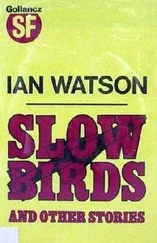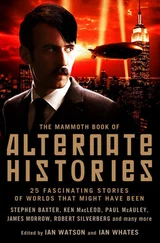
Ian Watson
Stalin's Teardrops
Part I: The Lie of the Land
"This is the era of clarity now, Valentin," Mirov reproved me. "I don't necessarily like it, but I am no traitor. I have problems, you have problems. We must adapt."
I chuckled and then said, "In this office we have always adapted, haven't we?"
By "office" I referred to the whole cluster of studios which composed the department of cartography. Ten in all, these were interconnected by archways rather than doors so that my staff and I could pass freely from one to the next across a continuous sweep of parquet flooring. In recent years I had resisted the general tendency to subdivide spacious rooms which, prior to the Revolution, had been the province of a giant insurance company. For our drawing tables and extra-wide filing cabinets we needed elbow-room. We needed as much daylight as possible from our windows overlooking the courtyard deep below. Hence our location here on the eighth floor; hence the absence of steel bars at our windows, and ours alone. Grids of shadow must not fall across our work.
On hot summer days when breezes blew in and out we needed to be specially vigilant. (And of course we used much sealing wax every evening when we locked up.) In winter, the standard lighting-those big white globes topped by shades-was perfectly adequate. Still, their illumination could not rival pure daylight. We often left the finalization of important maps until the summer months.
Mirov's comments about clarity seemed spurious in the circumstances; though with a sinking heart I knew all too well what he meant.
"We have lost touch with our own country," he said forlornly, echoing a decision which had been handed down from on high.
"Of course we have," I agreed. "That was the whole idea, wasn't it?"
"This must change." He permitted himself a wry joke. "The lie of the land must be corrected."
Mirov was a stout sixty-five-year-old with short grizzled hair resembling the hachuring on a map of a steep round hillock. His nose and cheeks were broken-veined from over-indulgence in the now-forbidden spirit. I think he resented never having been attached to one of the more glamorous branches of our secret police. Maybe he had always been bored by his job, unlike me.
Some people might view the task of censorship as a cushy sinecure. Not so! It demanded a logical meticulousness which in essence was more creative than pedantic. Yet it was, well, dusty. Mirov lacked the inner forcefulness which might have seen him assigned to foreign espionage or even to the border guards. I could tell that he did not intend to resist the changes which were now in the air, like some mischievous whirlwind intent on tossing us all aloft. He hadn't come here to conspire with me, to any great extent.
As head of censorship Mirov was inspector of the department of cartography. Yet under my guidance of the past twenty years cartography basically ran itself. Mirov routinely gave his imprimatur to our products: the regional and city maps, the charts, the Great Atlas. Two years his junior, I was trusted. The occasional spy whom he planted on me as a trainee invariably must deliver a glowing report. (Which of my staff of seventy persons, busily drafting away or practising, was the current "eye of Mirov"? I didn't give a hoot.) As to the quality of our work, who was more qualified than myself to check it?
"What you're suggesting isn't easy," I grumbled. "Such an enterprise could take years, even decades. I was hoping to retire by the age of seventy. Are you implying that I stay on and on forever?" I knew well where I would retire to…
He rubbed his nose. Did those broken capillaries itch so much?
"Actually, Valentin, there's a time limit. Within two years-consisting of twenty-four months, not of twenty-nine months or thirty-two; and this is regarded as generous-we must publish a true Great Atlas. Otherwise the new economic plan… well, they're thinking of new railway lines, new dams, new towns, opening up wasteland for oil and mineral exploitation."
"Two years?" I had to laugh. "It's impossible, quite impossible."
"It's an order. Any procrastination will be punished. You'll be dismissed. Your pension rights will diminish: no cabin in the countryside, no more access to hard-currency shops. A younger officer will replace you-one of the new breed. Don't imagine, Valentin, that you will have a companion in misfortune! Don't assume that I too shall be dismissed at the summit of my career. My other bureaus are rushing to publish and promote all sorts of forbidden rubbish. So-called experimental poetry, fiction, art criticism. Plays will be staged to shock us, new music will jar the ears, new art will offend the eye. Happenings will happen. Manuscripts are filed away under lock and key, after all-every last item. We only need to unlock those cupboards, to let the contents spill out and lead society astray into mental anarchy."
I sympathised. "Ah, what we have come to!"
He inclined his cross-hatched hill-top head.
" You , Valentin, you . What you have come to." He sighed deeply. "Still, I know what you mean… Colonel."
He mentioned my rank to remind me. We might wear sober dark suits, he and I, but we were both ranking officers.
"With respect, General, these-ah-orders are practically impossible to carry out."
"Which is why a new deputy-chief cartographer has been assigned to you."
"So here is the younger officer you mentioned-already!"
He gripped my elbow in the manner of an accomplice, though he wasn't really such.
"It shows willing," he whispered, "and it's one way out. Let the blame fall on her if possible. Let her seem a saboteur." Aloud, he continued, "Come along with me to the restaurant, to meet Grusha. You can bring her back here yourself."
I should meet my nemesis on neutral territory, as it were. Thus Mirov avoided direct, visible responsibility for introducing her.
Up here on the eighth floor we in cartography had the advantage of being close to one of the two giant restaurants which fed the thousands of men and women employed in the various branches of secret police work. The other restaurant was down in the basement. Many staff routinely turned up at eight o'clock of a morning-a full hour earlier than the working day commenced-to take advantage of hearty breakfasts unavailable outside: fresh milk, bacon and eggs, sausages, fresh fruit.
As I walked in silence with Mirov for a few hundred metres along the lime-green corridor beneath the omnipresent light-globes, I reflected that proximity to the restaurant was less advantageous today.
At this middle hour of the morning the food hall was almost deserted but for cooks and skivvies. Mirov drank the excellent coffee and cream with almost indecent haste so as to leave me alone with the woman. Grusha was nudging forty but hadn't lost her figure. She was willowy, with short curly fair hair, a large equine nose, and piercing sapphire eyes. A nose for sniffing out delays, eyes for seeing through excuses. An impatient thoroughbred! An intellectual. The privileged daughter of someone inclined to foreign and new ways. Daddy was one of the new breed who had caused so much upset. Daddy had used influence to place her here. This was her great opportunity; and his.
"So you were originally a graduate of the Geographical Academy," I mused.
She smiled lavishly. "Do I take it that I shall find your ways a little different, Colonel?"
"Valentin, please."
"We must mend those ways. I believe there is much to rectify."
"Are you married, Grusha?"
Читать дальше













